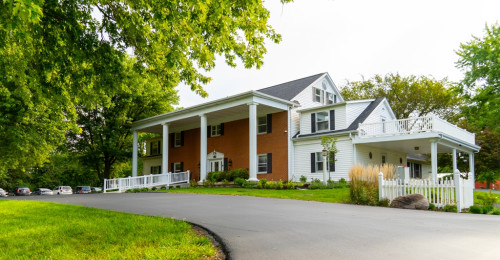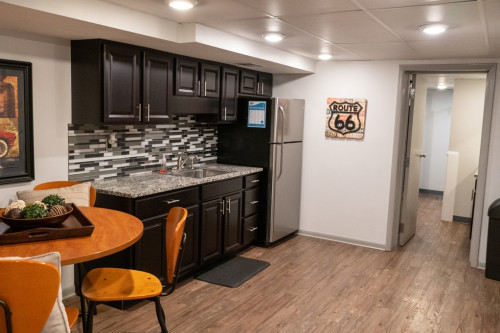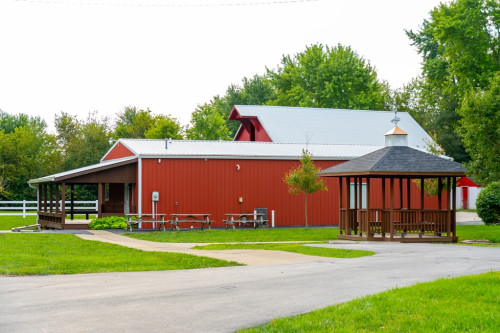





Tara Treatment Center
Treatment Focus
This center treats substance use disorders and co-occurring mental health conditions. Your treatment plan addresses each condition at once with personalized, compassionate care for comprehensive healing.
Primary Level of Care
Offering intensive care with 24/7 monitoring, residential treatment is typically 30 days and can cover multiple levels of care. Length can range from 14 to 90 days typically.
Claimed
Recovery.com has connected directly with this treatment provider to validate the information in their profile.
Treatment Focus
This center treats substance use disorders and co-occurring mental health conditions. Your treatment plan addresses each condition at once with personalized, compassionate care for comprehensive healing.
Primary Level of Care
Offering intensive care with 24/7 monitoring, residential treatment is typically 30 days and can cover multiple levels of care. Length can range from 14 to 90 days typically.
Provider's Policy
We accept all Indiana Medicaid and commerical insurance.
Tara Treatment Center
Tara Treatment Center
About Tara Treatment Center
Nestled in the peaceful countryside of Franklin, Indiana, Tara Treatment Center has been providing a warm, home-like environment where men and women can focus on healing from substance use disorder since 1985. Treatment combines evidence-based therapies, education, and 12-Step support with holistic modalities like art therapy and yoga. Their approach is holistic, addressing the mental, physical, and spiritual aspects of recovery, and they offer a full continuum of care to meet individuals wherever they are on their journey.
Care Continuum
Tara's services for clients include sub-acute detox, 24-hour residential care in gender-specific environments, day (PHP) treatment, intensive outpatient (IOP) care, transitional living for men, and aftercare connections. Their residential program typically lasts 30-42 days, depending on individual needs. Their day treatment runs as long as needed on Mondays through Thursdays in the evenings for 5 hours, suited for clients balancing treatment with work or family responsibilities. They hold their IOP on Monday, Tuesday, and Thursday evenings, with educational programming integrated into sessions.
Follow-Up Men's Transitional Living
For clients who complete Tara's residential program, their transitional and sober living programs encourage independence while maintaining a structured recovery environment, with opportunities for work, community involvement, and peer support. The tranquil campus offers walking paths, outdoor recreational activities, and comfortable accommodations designed to feel like home. Individuals begin to implement a higher level of self-accountability into their recovery as they attend meetings at the facility and participate in a combination of employment, community work, and social networking.
Free Family Support
In addition to serving clients, Tara offers free, in-depth education and support for family and loved ones. The program helps loved ones understand the disease of addiction and the basic concepts of recovery. It also assists them in identifying the struggles of the client, while allowing them to work on their own personal growth.
Center Overview
Treatment Focus
This center treats substance use disorders and co-occurring mental health conditions. Your treatment plan addresses each condition at once with personalized, compassionate care for comprehensive healing.
Insurance Accepted
Cash Pay Rates
Estimated Cash Pay Rate
Center pricing can vary based on program and length of stay. Contact the center for more information. Recovery.com strives for price transparency so you can make an informed decision.
Levels of Care







Your Care Options
Specializations
Alcohol
Using alcohol as a coping mechanism, or drinking excessively throughout the week, signals an alcohol use disorder.
Co-Occurring Disorders
A person with multiple mental health diagnoses, such as addiction and depression, has co-occurring disorders also called dual diagnosis.
Drug Addiction
Drug addiction is the excessive and repetitive use of substances, despite harmful consequences to a person's life, health, and relationships.
Who We Treat
Men and Women
Men and women attend treatment for addiction in a co-ed setting, going to therapy groups together to share experiences, struggles, and successes.
Approaches
Evidence-Based
A combination of scientifically rooted therapies and treatments make up evidence-based care, defined by their measured and proven results.
Holistic
A non-medicinal, wellness-focused approach that aims to align the mind, body, and spirit for deep and lasting healing.
Twelve Step
Incorporating spirituality, community, and responsibility, 12-Step philosophies prioritize the guidance of a Higher Power and a continuation of 12-Step practices.
Therapies
1-on-1 Counseling
Patient and therapist meet 1-on-1 to work through difficult emotions and behavioral challenges in a personal, private setting.
Art Therapy
Visual art invites patients to examine the emotions within their work, focusing on the process of creativity and its gentle therapeutic power.
Equine Therapy
Guided interactions with trained horses, their handler, and a therapist can help patients improve their self-esteem, trust, empathy, and social skills.
Family Therapy
Family therapy addresses group dynamics within a family system, with a focus on improving communication and interrupting unhealthy relationship patterns.
Gestalt Therapy
This treatment teaches self-awareness, interrupts negative thought patterns, and gives patients insight into how their environment impacts mental health.
Motivational Interviewing and Enhancement Therapy (MET)
This approach is based on idea that motivation to change comes from within. Providers use a conversational framework that may help you commit to recovery.
Psychoeducation
This method combines treatment with education, teaching patients about different paths toward recovery. This empowers them to make more effective decisions.
Relapse Prevention Counseling
Relapse prevention counselors teach patients to recognize the signs of relapse and reduce their risk.
Twelve Step Facilitation
12-Step groups offer a framework for addiction recovery. Members commit to a higher power, recognize their issues, and support each other in the healing process.
Conditions We Treat
Anxiety
Anxiety is a common mental health condition that can include excessive worry, panic attacks, physical tension, and increased blood pressure.
Codependency
Codependency is a pattern of emotional dependence and controlling behavior. It's most common among people with addicted loved ones.
Depression
Symptoms of depression may include fatigue, a sense of numbness, and loss of interest in activities. This condition can range from mild to severe.
Substances We Treat
Alcohol
Using alcohol as a coping mechanism, or drinking excessively throughout the week, signals an alcohol use disorder.
Benzodiazepines
Benzodiazepines are prescribed to treat anxiety and sleep issues. They are highly habit forming, and their abuse can cause mood changes and poor judgement.
Co-Occurring Disorders
A person with multiple mental health diagnoses, such as addiction and depression, has co-occurring disorders also called dual diagnosis.
Cocaine
Cocaine is a stimulant with euphoric effects. Agitation, muscle ticks, psychosis, and heart issues are common symptoms of cocaine abuse.
Drug Addiction
Drug addiction is the excessive and repetitive use of substances, despite harmful consequences to a person's life, health, and relationships.
Heroin
Heroin is a highly addictive and illegal opioid. It can cause insomnia, collapsed veins, heart issues, and additional mental health issues.
Methamphetamine
Methamphetamine, or meth, increases energy, agitation, and paranoia. Long-term use can result in severe physical and mental health issues.
Opioids
Opioids produce pain-relief and euphoria, which can lead to addiction. This class of drugs includes prescribed medication and the illegal drug heroin.
Languages
Aftercare
Care Designed for Your Needs
Personal Amenities
Amenities
Activities
Yoga
Yoga is both a physical and spiritual practice. It includes a flow of movement, breathing techniques, and meditation.
What people are saying
Treatment
3.2
Accommodations
3.3
Food & Nutrition
3.4
Value
3.4
Anonymous
Treatment in 2019 • (90 days) • Reviewed 02/05/26
Former Client
•Indiana
Rachel
Reviewed 05/06/21
Review from Rehabs.com
Anonymous
Reviewed 01/30/19
Review from Rehabs.com
Jan
Reviewed 06/09/15
Review from Rehabs.com
MW
Reviewed 05/19/15
Review from Rehabs.com






